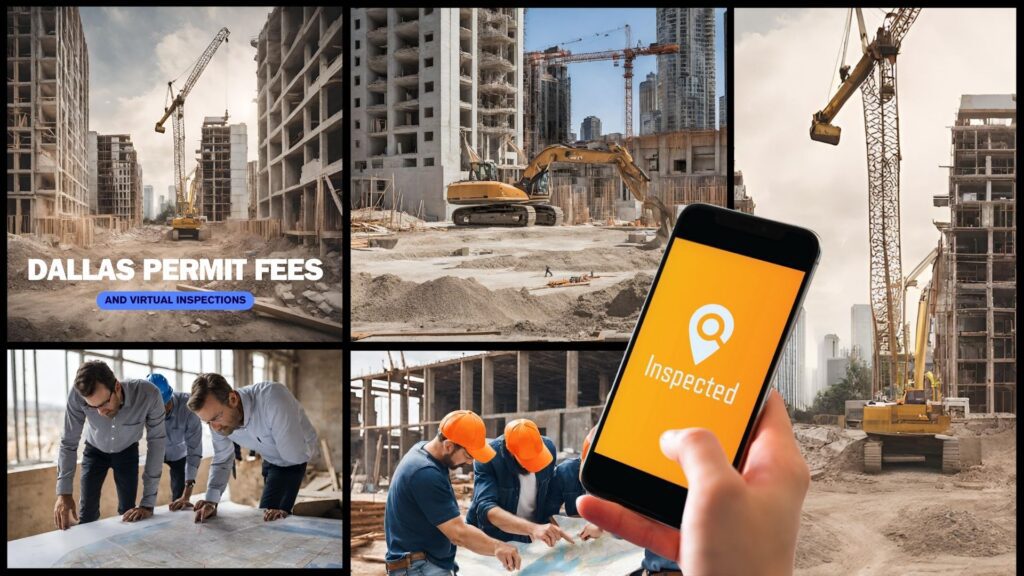Dallas is in a pickle, facing a $20 million gap in its building permitting department. Since 2015, the city’s fees have been low compared to other big Texas cities. They’re considering cranking those fees up to make ends meet, causing quite the stir. Developers are unhappy, again highlighting virtual inspections as pressure relief valves and digital transformation saviors.

Proposed fee hikes could see costs like excavation fees jump from a modest $100 to a whopping $2,825. The city’s leaders are batting around the idea of easing into these increases.
The delicate balance between getting the department’s budget back on track and not scaring off the people who build the city’s homes and offices hangs in the balance.
Meanwhile, we recently covered Aquinnah, a similar drama unfolding but on a smaller scale. This charming town recently shifted from flat-rate to cost-based permit fees, aiming for fairness but sparking debate among luxury home builders.
It’s an interesting contrast: Aquinnah’s serene landscapes against Dallas’ urban sprawl, both wrestling with how to charge for the cost of growth fairly.
National Trends
These local dilemmas mirror a national trend: a predicted decline in home improvement spending by over $30 billion in 2024, as highlighted by a recent report.
This expected downturn in renovation expenditure, attributed to high project costs, soaring interest rates, and a slowdown in home sales, underscores a broader economic shift impacting cities and their residents.
A Harvard University study suggests the spike in home improvement spending during the COVID-19 pandemic is tapering off, returning to pre-pandemic levels.
This recalibration indicates that the permit fee increases in Dallas and Aquinnah intersect with a period of reduced appetite for large-scale home renovations, adding another layer of complexity to the issue.
The tension in Dallas also reflects a broader trend: cities must juggle fiscal responsibilities with nurturing development. Aquinnah’s approach, adjusting fees to better reflect construction values, mirrors Dallas’ intention, albeit in a different context.
Search For Balance
Both cities are searching for a balance where fees reflect the service’s value without dampening the spirit of development.
As Dallas mulls over a phased approach to fee increases, it’s worth noting how Aquinnah’s already-implemented changes have played out.
Ultimately, this dialogue unlocks opportunities for cities like Dallas and small towns like Aquinnah to embrace disruptive technology like Virtual Inspections without the steep price tag.
The Virtual Inspection Blueprint
The new blueprint for cities nationwide turns the challenge of fee restructuring into an opportunity for modernization and improved transparency.
Integrating virtual inspections opens up transparency and hyper-efficient processes for inspecting and permitting. Now, municipal and contracting teams can chase uniform adherence to code requirements by inspectors, fostering consistent quality and minimizing the risk of biased approvals.
Features inherent to virtual inspections, such as documentation and geotagging, inject an added layer of accountability into the inspection process.
Remote video inspections, which offer structured and well-documented approaches, recording every step and simplifying the task of tracing accountability.
This is particularly beneficial in environments where the transparency of the inspection process is paramount.
Moreover, using cloud storage and searchable records within virtual inspection platforms enhances oversight by making inspection reports readily accessible for building officials to review.
While virtual inspections may be subject to certain regulatory restrictions, such as fire safety checks, their comprehensive scope ensures thorough compliance across many other inspection types.
This breadth of coverage is instrumental in maintaining high safety and compliance standards within the construction and renovation sectors.
Virtual inspection platforms effectively address quality concerns by mandating uniform training for inspectors and requiring licensing.
They maintain a consistent inspection quality that traditional methods may need help to achieve.
The detailed and accessible records generated by virtual inspections facilitate more effective and frequent government audits, bolstering the inspection process’s transparency and reliability.
Positive testimonials on Inspected.com and the strong reputation garnered by virtual inspection platforms in various regions, such as Florida, underscore their reliability and professionalism. This has positively influenced public and industry perception, highlighting the transformative potential of virtual inspections in building regulation and compliance.
Furthermore, the partnership between inspection platforms and regulatory bodies ensures that safety and compliance are prioritized, even when expedited reviews are necessary.
Virtual inspections comprehensively address concerns related to limited information requests, ensuring that a rich dataset is available for permit evaluations. Thus, they enhance the quality and thoroughness of the inspection process.
Integrating virtual inspections into city planning and building regulation represents a significant step forward in modernizing and improving the transparency and effectiveness of these essential processes.
This approach supports sustainable urban development while ensuring safety and compliance standards are met, benefiting all stakeholders.
It should also be a key area of focus for both municipalities and developers in Dallas and Aquinnah.